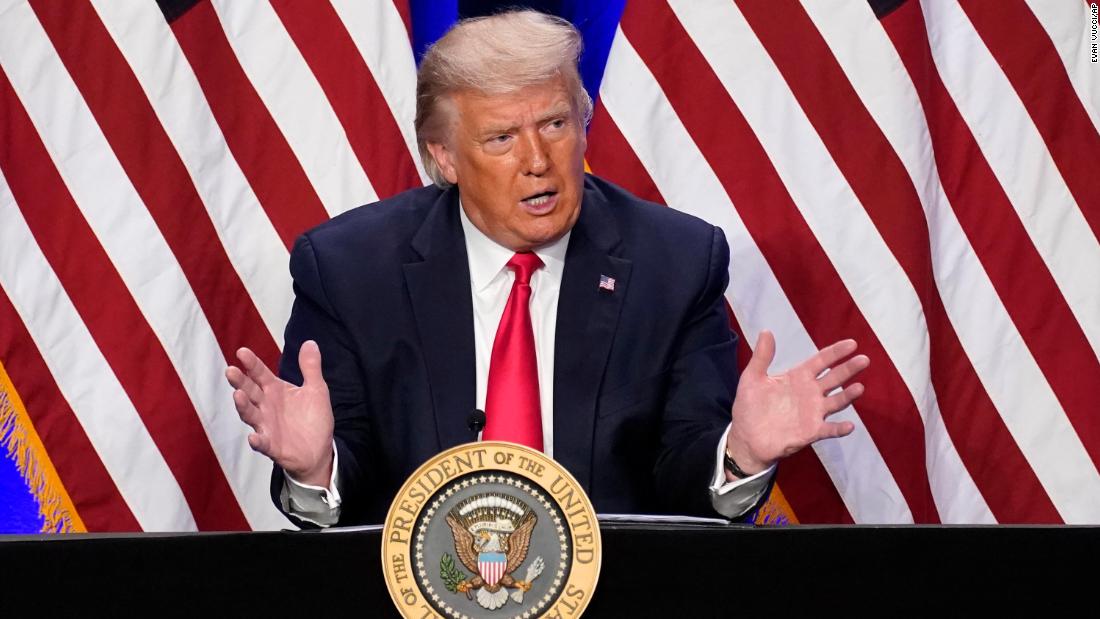
Facing a persistent polling deficit against Democratic nominee Joe Biden, Trump and Republican allies have undertaken an array of efforts to stop election officials from making voting easier during the coronavirus pandemic. The President fogs the autumn air with groundless complaints of fraud while lawyers on his behalf challenge such adjustments as mail-in voting, expanded use of ballot drop-boxes, and relaxed deadlines for counting ballots that show up late in the mail.
But courts in red and blue states alike have repeatedly rebuffed them. They've done it for the same reason that FBI Director Christopher Wray and longtime Republican election lawyer Ben Ginsberg have rebuffed him in recent days: decades of fruitless searching have shown that widespread election fraud simply does not exist.
"An utter dearth of absentee fraud," wrote US District Judge J. Michelle Childs in slamming Republican insistence on witnesses for absentee voting in a South Carolina case. She concluded the witness requirement would expose vulnerable people to coronavirus.
No surprise, perhaps, since President Barack Obama put Childs on the federal bench. But Republican-appointed judges have pushed back, too.
"Generalized," "speculative," "unpersuasive," was how US District Judge James Mahan characterized GOP claims in a case challenging Nevada's decision to adapt to the pandemic by mailing ballots to every registered voter. Mahan, appointed by President George W. Bush, threw the case out.
Even judges selected by Trump himself have declined to help. In Michigan, US District Judge Stephanie Dawkins Davis blocked a state ban on hired drivers taking voters to the polls. In Pennsylvania, US District Judge Nicholas Ranjan deferred to the state Supreme Court's decision to extend absentee ballot deadlines and permit the use of drop-boxes for those ballots.
Republicans haven't lost everywhere. In Texas, an electoral giant where Democrats have grown increasingly competitive, the state attorney general has blocked local election officials from accepting fear of coronavirus as a valid excuse for anyone requesting an absentee ballot.
In Florida, courts have upheld the GOP-controlled legislature's decision to nullify voting rights for former felons unless they repay court costs of their cases. Just two years ago, voters in that critical battleground overwhelmingly approved a ballot measure to restore their voting rights without financial requirements.
Nor are lawsuits Trump's only tool for upending an election he's currently losing. He also aims to sow public distrust in the results, just like the Russian intelligence operatives who boosted his 2016 campaign and, according to US national security officials, are doing the same thing now.
To some extent, that's working. A recent Pew Research poll showed that 59% of Republicans, compared to just 18% of Democrats, believe easier voting rules make elections less secure. Any Trump attempt to challenge election results would draw on that sense of unease among his supporters.
Yet outside courthouses, advocates of expanded voting rights say an election system administered by states and local governments has shown notable resilience for a contest expected to inspire massive turnout despite the pandemic. With reputations dependent on smoothly-run processes for voting and vote-counting, election supervisors tend to be among the least partisan of public servants.
"There's been an impressive mobilization of civil society," says Wendy Weiser, who directs the Democracy Program at the New York University Law School's Brennan Center for Justice. Professional sports teams have made arenas available as giant polling places; former New York Mayor Michael Bloomberg has pledged millions to pay court costs for a large chunk of those former felons in Florida.
"I am actually more confident than most that we will be able to adapt to the pandemic," says Nathaniel Persily, a Stanford Law professor who co-founded the joint Stanford-MIT Healthy Elections Project. With five weeks remaining, Michael McDonald, an elections specialist at the University of Florida, calls the situation "the best of where I could hope we could be."
Legal wrangling has a long way to go. Pennsylvania, one of three Midwest battlegrounds that tipped the 2016 election to Trump, looms as the most important single venue.
Democrats are weighing an appeal to federal courts of the state Supreme Court ruling disqualifying so-called "naked ballots" dropped off by voters who neglect to use the security envelope used to verify their eligibility. Analysts project as many of 100,000 of them in a state Trump won by only 44,000 votes.
Republicans plan to appeal the Pennsylvania Supreme Court's rulings on absentee ballot deadlines to the US Supreme Court. After the passing of Ruth Bader Ginsburg, Republican-appointed justices now hold a 5-3 advantage -- heading for 6-3 if the Senate approves Trump's nominee as expected.
If they hold, Biden's steady leads in electorally-decisive states diminish the likelihood of an election close enough to hinge on a single court case.
The series of presidential debates, which begin this week, may represent Trump's last best chance to narrow the gap. By the time debates end on October 22, Persily hopes legal fights will have calmed sufficiently for local elections officials to have the clear guidance they need to do their jobs.
"You need to make sure there's a point where the music stops," he says.
"many" - Google News
September 27, 2020 at 06:49PM
https://ift.tt/33XOAE0
Trump has stacked the federal bench, but he's not winning many election court battles - CNN
"many" - Google News
https://ift.tt/2OYUfnl
https://ift.tt/3f9EULr
No comments:
Post a Comment